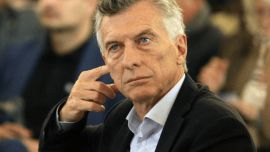President Alberto Fernández spent Christmas Eve in the Saint Cajetan Church in the Buenos Aires City neighbourhood of Liniers, a bastion of Catholic devotion and charity awareness. It was a new show of the symbolic political equilibrium that Fernández, as the Peronist he is, permanently seeks to strike, à la Pope Francis. During a toast with Casa Rosada staff a few hours earlier, Fernández had insisted that Argentines will have to make “an effort” in order to “first help those who most need it.”
The president likely starts his first calendar year at the country’s highest political chair with a wishlist of things he would like to achieve. So what exactly is on Alberto Fernández’s New Year’s resolution list for 2020?
- 1. Lose weight.
Argentina’s State is heavy, and the recent emergency package passed by Congress will make it even fatter. If things go according to plan, the new tax package will add around two percentage points of the GDP in tax revenue, which the Fernández administration describes as an action of “solidarity” (albeit compulsory) from the most privileged to the poorest sectors of Argentina’s society.
The solidarity argument is at least debatable, if one takes a quick look at the festive reaction in bonds and stock markets these days, given the prospect that most of that extra money would go to repay government debt. Fernández is making the State a little heavier on Argentines and hoping to make debt load a little lighter on them in turn.
- 2. Exercise more.
Argentina has to get moving. The country’s economy has been stagnant for a decade now, and in freefall over the last two years. GDP per capita, for instance, is the same it was in 2010.
The emergency package published into law this week had the word “solidarity” in its title followed by “economic revitalisation.” It is unclear how rising taxes could bolster and deliver the investment the country needs to create jobs and grow, but at least the government says it believes some of these new taxes are temporary (even if temporary in Argentina means five years, which is technically the duration of the new 30 percent tax on the purchase of US dollars).
- 3. Learn a new skill or hobby.
Fernández is learning to be president on the job (as most people do, to be fair). He has role models to follow, but he should avoid the risk of looking too much like Néstor Kirchner in the rosy early years of Kirchnerismo or like Cristina Fernández de Kirchner in the more difficult second half of the Kirchnerite era.
Though he hardly managed to act presidential during the campaign, he will be tested repeatedly during next year and will have to show temperance in crisis. Also, while commenting on reality had been Fernández’s top political hobby since he quit his Cabinet Chief position in 2008, he will now have to learn that a president’s word amounts to State will – and action.
- 4. Spend more time with family and friends.
A Peronist president is by default (excuse the word in this context) also the leader of the Peronist party. This is not so obviously true in the case of Fernández though, given the clout of his vice-president. But although Cristina Fernández de Kirchner should be credited for a large part of the 48 percent of votes that the Frente de Todos presidential ticket won, the former president’s leadership continues to face resistance within the party.
Fernández faces the task of aligning other Peronists behind him, but also of a non-political leadership capable of counterbalancing the most radical factions of the ruling coalition. The recent show of unity between union and business leaders was a clear step in that direction.
- 5. Get organised.
His government is still in the making. Vast sectors of the new administration have not been formally appointed, even if people are already working there. Beyond the emergency, the drive to fight hunger and the impending negotiations with the International Monetary Fund and private creditors, Fernández has not outlined a governing agenda.
True, this sounds like a heavy load for only three weeks on the job, but he runs the risk of running an administration that’s in a permanent state of emergency, struggling to find North and a way out of the crisis.
It is likely that the president has lots more resolutions in mind but, as the year-end self-help books would argue, it is always better to keep your resolutions down to a manageable amount and eventually break up larger goals into smaller ones.
Running a country like Argentina after all, seems akin to creating miracles every day.





















Comments